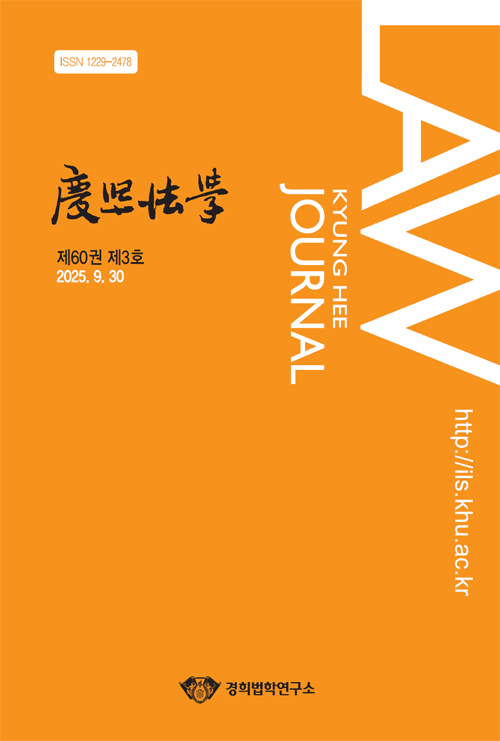- 영문명
- 발행기관
- 경희법학연구소
- 저자명
- 채샤오펑(XIAOFENG CAI) 진길유(JIYU CHEN) 왕소려(XIAOLI WANG)
- 간행물 정보
- 『경희법학』제60권 제3호, 43~89쪽, 전체 47쪽
- 주제분류
- 법학 > 민법
- 파일형태
- 발행일자
- 2025.09.30
8,440원
구매일시로부터 72시간 이내에 다운로드 가능합니다.
이 학술논문 정보는 (주)교보문고와 각 발행기관 사이에 저작물 이용 계약이 체결된 것으로, 교보문고를 통해 제공되고 있습니다.

국문 초록
가상 캐릭터 간 발생하는 성적 침해는 생리학적 의미의 자연인을 직접적으로 포함하지 않는다. 그러나 이러한 행위를 ‘성적 침해’로 규정할 수 있는지에 대해서는 여전히 논란이 존재한다. 이는 현실의 성적 행위와 동일시하기 어렵기 때문이다. 하지만 메타버스의 아바타는 단순한 가상 존재가 아니다. 그 외형과 움직임은 사용자가 선택하고 실시간으로 구현되며, 시뮬레이션 기술을 통해 인간의 감각을 재현하거나 심지어 초월할 수 있다. 이러한 기술적 사실성은 가상세계에서의 경험을 강한 현실감으로 전환시켜, ‘가상 성폭력’을 감각적 차원에서 매우 실제적인 것으로 만든다. 메타버스 기술이 발전할수록 현실과 가상의 경계는 점차 모호해지고, 온라인과 오프라인 간 전환은 완전히 매끄러워져 결국 양자의 구분이 불가능해질 수 있다. 나아가 인간의 일상 활동이 메타버스에 깊이 통합되어 현실 사회의 상호작용 기능을 대체하게 된다면, 가상 공간에서의 범죄 규율은 전례 없는 도전에 직면할 것이다.
가상 디지털 인물의 법적 주체성에 관한 논의는 자연인과 직접적으로 매핑되는 경우, 그 권리와 의무가 현실의 대응되는 자연인에게 귀속되어야 함을 시사한다. 가상 캐릭터가 인간의 의지에 의해 창조된 이상, 비인간 존재에게 민사 책임을 부여하는 ‘법인격의 법적 허구’에는 역사적 선례가 존재한다. 현대 민법 체계는 이미 협회, 재단, 회사, 조직 등 다양한 단체에 법적 허구를 통해 법인격을 부여하고 있다. 인간성은 생물학적 속성만으로 정의되지 않으며, 법이 부여한 기본적 권리와 능력에 의해 규정된다. 자연인과 법인은 본질적으로 책임 부과를 위한 입법적 산물이다.
가상 사회가 발전함에 따라, 자연인·법인·비법인 단체라는 전통적 범주만으로는 새로운 사회적 법적 주체를 충분히 포괄할 수 없다. 가상 디지털 인물의 등장은 민법상의 법인격과 유사한 새로운 법적 허구를 의미할 수 있다. 가상 경제의 지속적 발전을 위해서는 권리를 행사하고, 의무를 이행하며, 책임을 질 수 있는 독립적 법적 주체의 존재가 필요하다. 법적 주체성은 가상 권리와 의무의 기점이자 종착점으로 기능한다. 따라서 가상 디지털 인물에게 법적 능력을 부여함으로써 그들이 독립적으로 민사적 권리와 의무를 행사할 수 있도록 하는 것은 필수적이다. 이를 독립된 민사 주체 범주로 인정하는 것은 메타버스 법학 발전에 있어 중대한 의의를 지닌다.
본 논문은 이러한 맥락에서 엄밀한 개념적 분석을 통해, 형법이 신흥 현상을 충분히 규율하지 못하는 경우 민법이 수행할 수 있는 보충적·과도기적 기능을 밝히고, 민사 주체 확장이 메타버스 법학에서 가지는 제도적 가치를 제시하고자 한다.
영문 초록
Sexual assault occurring between two virtual characters does not involve biological individuals in the physiological sense. Nevertheless, whether such interactions constitute “sexual assault” remains contested, as they are difficult to equate with genuine physical acts. Avatars in the metaverse are not ordinary virtual entities: their appearances and movements are consciously selected by users and generated in real time. They replicate—and in some respects even surpass—human sensory perception within the digital sphere, thereby achieving authenticity through simulation technologies. This realism renders “virtual assault” profoundly real at the level of human perception. As metaverse technologies advance, the boundary between the physical and the virtual will become increasingly blurred. Once human activities are deeply embedded in the metaverse so that it fulfils the core social-interaction functions of the real world, regulating crimes in this environment will present unprecedented challenges.
Debates concerning the legal subject status of virtual digital persons suggest that, where there is a direct mapping to a natural person, the associated rights and obligations should be attributed to that real-world counterpart. Since virtual characters are created according to human will, the legal fiction of personification—assigning civil liability to non-human entities—has clear historical precedent. Modern civil-law systems already recognise associations, foundations, companies, and other organisations through such legal fictions. Humanity is defined not solely by biological attributes but by the fundamental rights and capacities conferred by law; both natural and juridical persons are legislative constructs designed for the allocation of liability. With the expansion of virtual society, the traditional categories of natural persons, legal persons, and unincorporated organisations no longer fully encompass emerging social entities. Recognising virtual digital persons may therefore represent a novel legal fiction analogous to juridical personhood.
To facilitate the development of the virtual economy, transactions require legal entities capable of exercising rights, assuming obligations, and bearing responsibilities. Legal subject status thus constitutes both the point of origin and the ultimate foundation of digital rights and duties. By conferring legal capacity on virtual digital persons, the law would enable them to exercise civil rights and obligations independently. Expanding the scope of civil subjects to include virtual digital persons as a distinct category carries landmark significance for the development of metaverse law. This paper adopts a rigorous conceptual framework to elucidate the compensatory function of civil law where criminal law remains inadequate, and to demonstrate how expanding the range of civil subjects can serve as a transitional mechanism in the jurisprudence of the metaverse.
목차
Ⅰ. Introduction
Ⅱ. The Necessity and Feasibility of Civil Remedies for Virtual Rape in the Metaverse
Ⅲ. Pathways for Implementing Civil Remedies Against Virtual Rape in the Metaverse
Ⅳ. Recommendations for Strengthening Civil Remedies in Response to Virtual Rape in the Metaverse
Ⅴ. Conclusion
References
키워드
해당간행물 수록 논문
참고문헌
교보eBook 첫 방문을 환영 합니다!

신규가입 혜택 지급이 완료 되었습니다.
바로 사용 가능한 교보e캐시 1,000원 (유효기간 7일)
지금 바로 교보eBook의 다양한 콘텐츠를 이용해 보세요!



